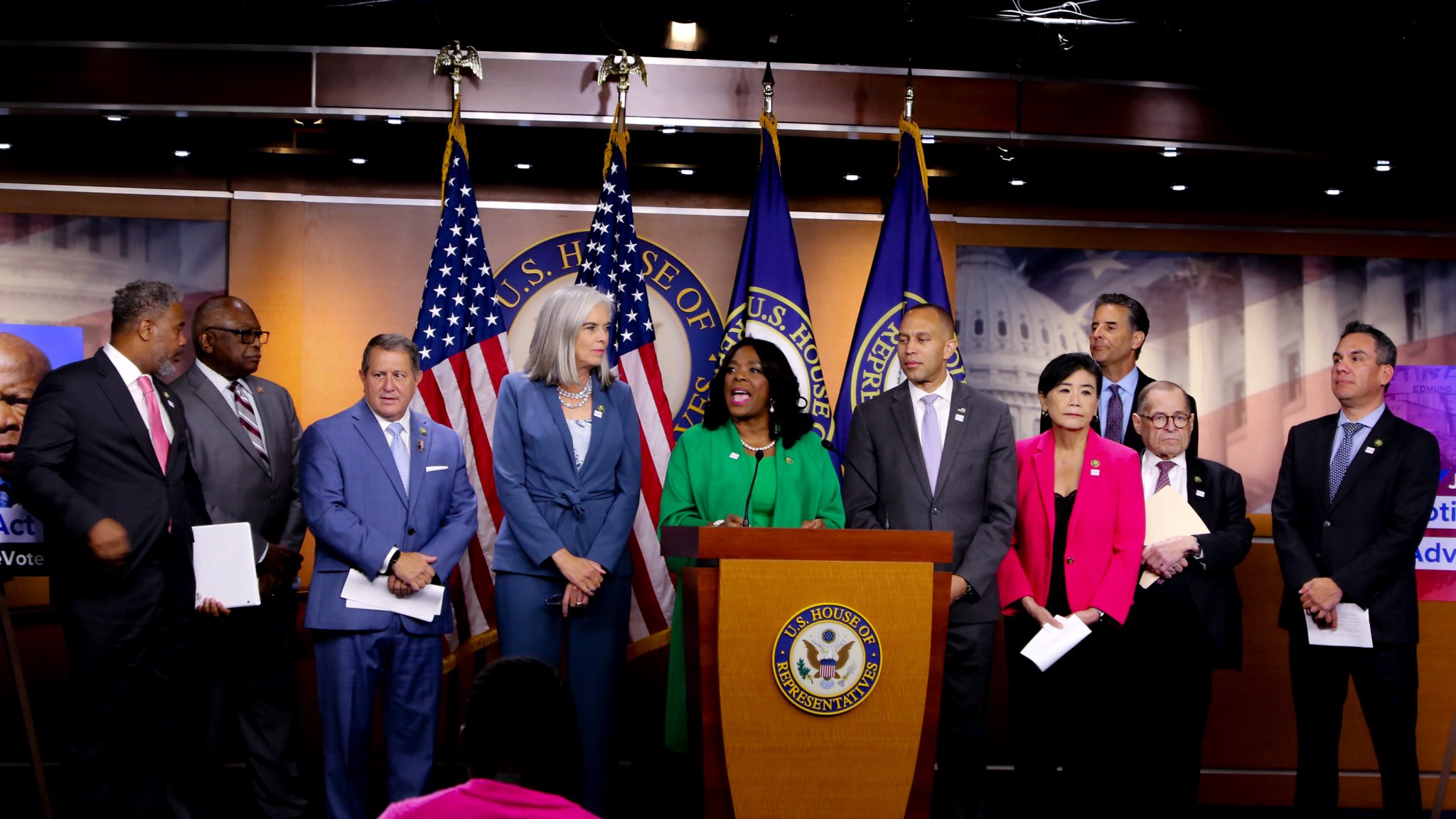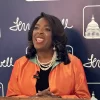|
Getting your Trinity Audio player ready...
|
On National Voter Registration Day, Tuesday, U.S. Rep. Terri Sewell, AL-07, Ranking Member of House Administration Committee Subcommittee on Elections, led every House Democrat in introducing HR14, the John R. Lewis Voting Rights Advancement Act. The bill would protect the right to vote and safeguard our democracy by restoring and modernizing the full protections of the Voting Rights Act of 1965 (VRA). Ten years ago, the Supreme Court gutted the VRA and unleashed a wave of discriminatory state laws targeting voters and restricting voting access. By restoring the VRA’s authority, the John R. Lewis Voting Rights Advancement Act would prevent such laws from taking effect in states and localities with a recent history of voter discrimination.
“Generations of Americans—many in my hometown of Selma, Alabama—marched, fought, and even died for the equal right of all Americans to vote,” said Rep. Terri Sewell, lead sponsor. “But today, their legacy and our very democracy are under attack as MAGA extremists target voters with new laws to restrict voting access. Ten years after the Supreme Court gutted the Voting Rights Act of 1965, the fight for voting rights has never been more urgent. The John R. Lewis Voting Rights Advancement would protect the right to vote and safeguard our democracy by restoring and modernizing the protections of the Voting Rights Act. It would prevent restrictive, discriminatory voting laws from taking effect and ensure every eligible American can have their vote cast and counted.”
For decades, the Voting Rights Act of 1965 (VRA) prevented states and localities with a history of voter discrimination from restricting voting access by requiring such jurisdictions to preclear new election laws with the Department of Justice or a U.S. District Court. However, in its disastrous 2013 decision in Shelby County v. Holder, the Supreme Court gutted the law and struck down the formula used to determine which jurisdictions are subject to federal oversight. In July 2021, the Court further weakened the law in its decision in Brnovich v. DNC, making it more difficult to challenge discriminatory voting laws under Section 2.
In the decade since the Supreme Court gutted the VRA, state legislators have advanced hundreds of new restrictive, discriminatory voting laws targeting minorities, young adults, and the elderly. Among other restrictions, these laws have closed polling stations, curbed early voting and voting by mail, imposed strict identification requirements, limited multi-lingual voting materials, and made it harder to register to vote. In 2023, state legislators passed a near-record number of new restrictive voting laws, according to the Brennan Center for Justice.
Named for the late Congressman and civil rights icon, the John R. Lewis Voting Rights Advancement Act would protect the right to vote and safeguard our democracy by restoring and modernizing the full protections of the VRA. The bill would establish a new, modern-day framework to determine which states and localities have a recent history of discrimination and require such jurisdictions to preclear new election changes, preventing restrictive and discriminatory voting laws from taking effect. The bill also restores Section 2 of the VRA by eliminating the heightened standard required to challenge discriminatory voting laws created by the Supreme Court in Brnovich v. DNC.
“The right to vote is sacred, it is central to the very integrity of our democracy,” said House Democratic Leader Hakeem Jeffries. “Unfortunately, extreme MAGA Republicans have decided that the only way they can win elections is to engage in massive voter suppression. It’s unconscionable, it’s unacceptable and un-American. The John R. Lewis Voting Rights Advancement Act will help ensure that every American has access to the ballot box so we can crush this epidemic of voter suppression once and for all.”
“Nearly sixty years after John Lewis marched across the Edmund Pettus Bridge, the sacred right to vote is still under threat. Since the January 6th attack, MAGA extremists have introduced hundreds of voter suppression bills in state legislatures — all to strengthen their power at the expense of the American people,” said House Democratic Whip Katherine Clark. “Today, Democrats are reintroducing the John Lewis Voting Rights Advancement Act, under the steadfast leadership of Congresswoman Terri Sewell. This legislation will preserve and protect our nation’s greatest treasure of free and fair elections for all. This is a call to action for Congressional Republicans: do you stand with Americans in the fight for democracy, or against us?”
“The right to vote is a sacred cornerstone of our democracy. My dear friend John Lewis recognized this and dedicated his life to expanding access to the ballot box. I’m proud to continue the fight and honor his memory by joining Rep. Sewell in reintroducing the John R. Lewis Voting Rights Advancement Act,” said Assistant House Democratic Leader James E. Clyburn. “We have a moral obligation to make this country’s greatness accessible and affordable for all Americans; fundamental to that mission is including all Americans in our great democracy. Congressional Democrats will always remain committed to this cause and urge our Republican colleagues to reconsider their partisan opposition to protecting the franchise.”
“The right to vote is the bedrock of our American democracy, and it is under threat. The John R. Lewis Voting Rights Advancement Act, together with the Freedom to Vote Act, will restore those protections, strengthen our democracy, and ensure every eligible voter has their voice heard,” said Committee on House Administration Ranking Member Joseph Morelle. “I’m a son of Rochester, New York, the home of two passionate and inspiring voting rights advocates, Frederick Douglass and Susan B. Anthony. Today, we honor their legacy, and the legacy of Congressman John Lewis, and continue the fight to help bring America closer to its foundational promise.”
“Voting rights are under renewed and sustained assault across the country and we must pass this bill now to restore the promise of the Voting Rights Act,” said House Judiciary Committee Ranking Member Jerrold Nadler. “After a series of troubling Supreme Court rulings, which have enabled voter suppression efforts by states and localities, the need for a revitalized Voting Rights Act has never been greater. I hope Congress will honor the sacrifices of those who marched, struggled, and even died to secure the right to vote and will rediscover the bipartisan spirit that once animated our work to protect the rights of all Americans to vote.”
“As we speak, extreme MAGA Republicans at the local, state, and national levels are running the table with every tactic in their arsenal to keep Black voters from the ballot box. These efforts are coordinated and well-funded and they are targeting our communities with precision,” said Congressional Black Caucus Chairman Steven Horsford. “Protecting Americans’ access to democracy should not be a partisan issue, and yet, time and again we have seen Republicans walk away from the formerly bipartisan commitment of ensuring access to the ballot box for all. The CBC is calling on Republicans to work with Democrats to pass the John R. Lewis Voting Rights Advancement Act and to put people over politics.”
“After the devastating Shelby v. Holder Supreme Court decision gutting key components of the Voting Rights Act a decade ago, certain states have criminalized individuals and groups assisting with voter registration, and withdrawn or denied the use of multilingual ballots and translators at the polls,” said Congressional Asian Pacific American Caucus Chairwoman Judy Chu. “These shameless voter disenfranchisement tactics especially hurt those in the AANHPI community—over a third of whom are limited English proficient and need multilingual support to exercise their right to vote. These and other voter suppression efforts like aggressive gerrymandering, restrictive voter ID laws, polling location closures, and restrictions on early voting weaken our democracy by limiting who can make their voices heard. That is why Congress must do its job and pass the John R. Lewis Voting Rights Advancement Act to protect and strengthen the right of all Americans—regardless of race, age, or language proficiency—to vote and have a say in our democracy.”
“As states across the country ramp up their enactment of voter suppression laws, we must put in place a new framework for voting protections and voter empowerment that safeguards every American’s ability to participate in our democracy,” said Rep. John Sarbanes, Co- Chair of the Task Force on Strengthening Democracy. “I am proud to honor the sacrifices my colleague and friend, Congressman John Lewis, and the other brave foot soldiers of the Civil Rights Movement made 58 years ago by joining in the introduction of this legislation to strengthen every voter’s access to the ballot box, regardless of their zip code, and build a democracy that uplifts the voices of all Americans.”





















































